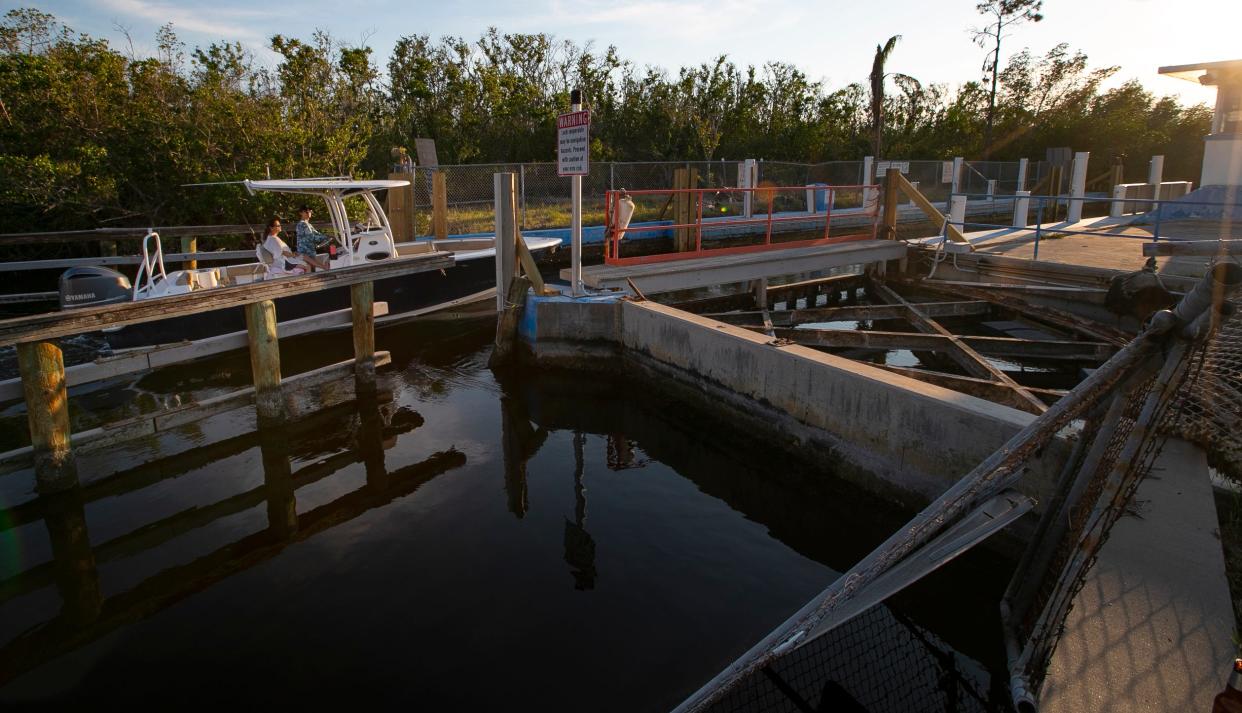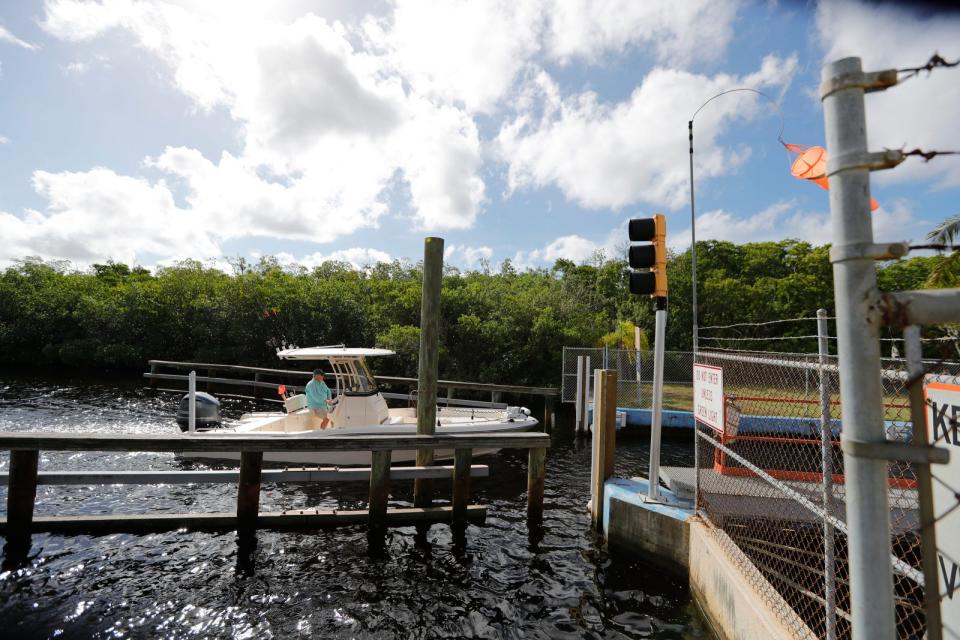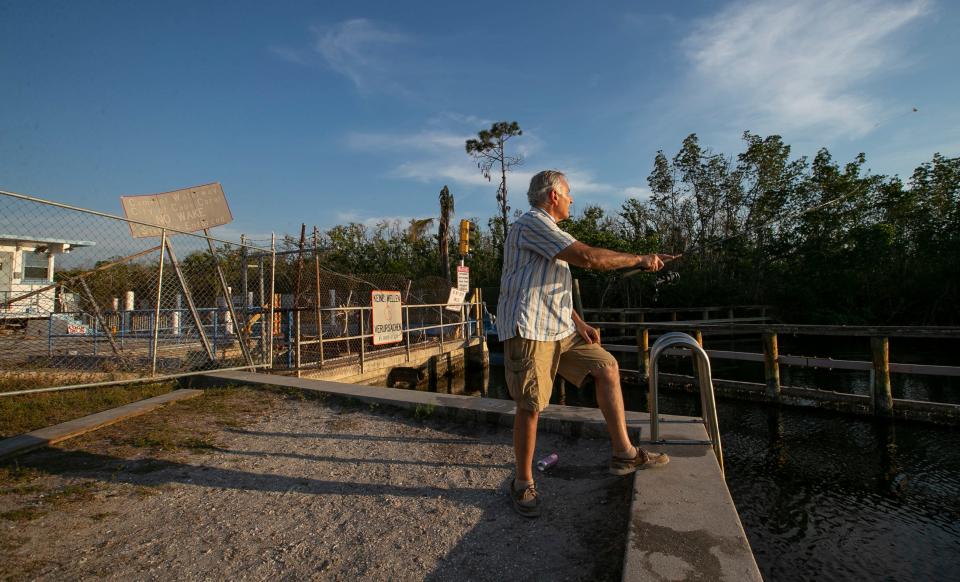Cape Coral's removal of the Chiquita Boat Lock faces challenges from barrier islands

Some high-profile groups are joining the fight to keep Cape Coral's Chiquita Boat Lock, a nearly 50-year-old manmade barrier, in operation, preventing the spread of pollution, destroying life-giving mangroves, and violating a long-standing agreement.
"A neutral look at this petition ought to lead anyone to conclude that a Cape Coral is not going to be able to remove the lock," said Michael Hannon, president of the Matlacha Civic Association.
This boat lock provides Gulf of Mexico access from Camelot Canal and Southwest Spreader Waterway.
The petition for a hearing was filed on April 19 in response to a notice of intent issued by the Florida Department of Environmental Protection on Feb. 17, 2023.
The petitioners include nonprofits such as the Matlacha Civic Association, Sanibel-Captiva Conservation Foundation, and Calusa Water Keepers.
FDEP has received the petition and is currently reviewing the "sufficiency" of the application.
Once the organization is finished with its review and deems a hearing necessary, the Division of Administrative Hearings will set a date.

What does the petition say?
The organizations contend that the Florida Department of Environmental Protection made a mistake in issuing the notice of intent and that Cape Coral is obligated is required to maintain the Chiquita Boat lock in place via a consent order,a voluntary agreement worked out between two or more parties to a dispute.
"Consent Order No. 15 remains in full force and effect today; yet, the City of Cape Coral has applied for an environmental resource permit to remove the Chiquita Boat Lock," the petition said.
The Chiquita Boat Lock and the removed Ceitus Boat Lift Barrier were built to settle a lawsuit against the builders of Cape Coral's 400-mile canal system to keep salt water from intruding on the Cape's freshwater resources.
The petition said Cape Coral and DEP have failed to "maintain those lands in their natural state in an environmentally responsible manner."
It claims that the removal of Chiquita Boat Lock will increase pollutants in the surrounding waters and harm mangroves.
"The removal of the Lock will alter the natural flow of water and allow direct flow of polluted canal waters into protected natural resource areas utilized by Petitioners, thus directly affecting their use and enjoyment of the water and natural resources of the area including Matlacha Pass Aquatic Preserve, San Carlos Bay, and the waters of Sanibel, Captiva, and Pine Islands," the petition said.
The water bodies around Matlacha and Pine Island, Matlacha Pass and Pine Island Sound, are designated impaired water, which means a water body is not meeting its applicable water quality standards, by The Coastal & Heartland National Estuary Partnership.
Previous coverage Could Cape Coral's Chiquita Boat Lock be removed?
Other Cape environment issues Residents troubled by Cape Coral canal clean up; FWC follows up
Recent Cape news Proposed FEMA trailer site in Cape Coral scrapped
The Calusa Waterkeeper is a not-for-profit organization dedicated to protecting and restoring the Caloosahatchee River & Estuary in Southwest Florida, and it is concerned about the possible increase of nitrogen and other pollutants.
"Total nitrogen, the parameter FDEP attributed to verified nutrient impairment in the Caloosahatchee estuary, San Carlos Bay, Pine Island Sound, and Matlacha Pass State Aquatic Preserve, increased from 251,148 pounds per year in 2014/2015 to 927,703 pounds per year in 2019/2020, a 267 % increase," the petition said.
Too much nitrogen and phosphorus in water can lead to algae growing faster and algae blooms, which can harm water quality, food resources and habitats, and decrease the oxygen that fish and other aquatic life need to survive
The petition lastly argues that the city failed to establish that the removal of the lock is not contrary to the public interest.
A report accompanied by the notice of intent says the removal is necessary "to improve navigability and boater safety."
It says that Cape Coral has not cited any evidence of any boating accidents or indicated the magnitude of boaters' use of the lock.

Cape Coral's effort of removing the lock
The city of Cape Coral has taken steps to remove the lock since 2018.
Boaters must wait, sometimes 15 to 30 minutes, to pass through when traveling to and from the Chiquita Boat Lock.
Matlacha residents have challenged the removal in the past with the city now including an environmental plan when removing the lock.
The South Spreader Waterway Environmental Improvement and Sustainability Project is Cape Coral's proposed answer to remove the Chiquita Lock by making water quality improvements for Matlacha Pass and the Caloosahatchee River.
These include:
Planting 3,000 mangrove seedlings along the waterway and installing oyster reef balls to stabilize the shoreline, improve water quality, and provide a nursery habitat that maintains fisheries.
Replacing stormwater catch basins that drain to the waterway and improving the stormwater management system at the nearby dog park to reduce nutrients entering the waterway.
Implementing an aquatic vegetation removal program to manage invasive non-native species.
Cape community news Cape Coral neighbors meet ahead of possible development of golf course
Cape storage moratorium Building permit moratorium for self-storage facilities passes in Cape Coral
Large Cape development coming Cape Coral's Hudson Creek development moves forward, but when can we move in?
Matlacha's president speaks
Hannon said Cape Coral should focuse on maintaining and improving water quality.
"It's time for Cape Coral to take advantage of its most priceless asset, the environment," he said.
Hannon said high-speed boat locks would be a better alternative to get boaters across the waters while maintaining the water.
"The residents of Cape Coral and those who want to move here would benefit enormously from high-speed locks on the Chiquita River and a high-speed lock where the Ceitus boatlift barrier used to be because that will go a long way to restoring our water quality," he said.
Luis Zambrano is a Watchdog/Cape Coral reporter for The News-Press and the Naples Daily News. You can reach Luis at Lzambrano@gannett.com. Follow him on Twitter @Lz2official.
This article originally appeared on Fort Myers News-Press: Possible removal of Cape Coral's Chiquita Boat Lock opposed

